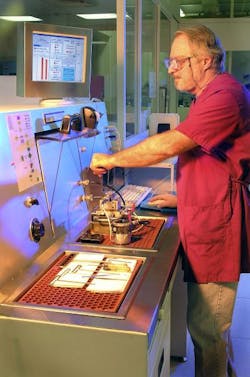Westmoreland Mechanical Testing & Research Inc. has watched its repair and replacement expenditures drop 52% by implementing a three-pronged approach to MRO optimization, focusing on inventory, repairs, and trade-ins of it servovalves. Westmoreland — which runs a global operation that tests materials for the aerospace, automotive, nuclear, and medical industries — operates more than 250 servohydraulic test frames to perform tensile, fatigue, and thermal testing.
“Some of our tests can last six months,” said Mike Rossi, Vice President of Operations for Westmoreland. “If a servovalve fails during a test program, it can be a disaster for project schedules, costs, and customer confidence.”
A refresher on servovalves
Before looking at how Westmoreland saved itself so much vis-à-vis expenditures, here is a brief refresher on the components of servovalves, which are at the heart of this story. The servovalve consists of a flapper nozzle, one or more spools, and a torque motor. Servovalves often have a mechanical (as opposed to electric) feedback mechanism, which provides a stabilizing force to the flapper. The servovalve controls how hydraulic fluid is channeled to an actuator, which will simulate a variety of stress factors.
When it comes to performing fatigue testing, servovalves that use mechanical feedback are generally thought of as having the fastest response time, enabling a test house to cycle a specimen to a point of fatigue in the shortest time.
To achieve the kind of high-performance response that a test house looks for when putting stress on an aircraft or automotive part, the servovalve’s design must have extremely tight clearances and small orifices. If there is any dirt or other particulate contamination in the fluid running through the servovalve, it will affect the performance of and accelerate the wear on the servovalve. In fact, most servovalves fail because technicians do not maintain the proper level of cleanliness in the fluid. Such failures are often the tell-tale sign of test rig failure.
Depending on where the servovalve sits on a test rig, the replacement of a valve can take anywhere from 10 to 30 minutes. A servovalve near the bottom of a test rig requires a technician to drain the fluid from the machine in order to replace the valve. The majority of Westmoreland’s 250 test rigs have an actuator with a dual servovalve manifold.
A three-fold approach
Westmoreland's cost-cutting approach was three-fold:
- Streamline its servovalve model inventory
- Improve the quality of the repairs made on its servovalves with help from Moog Inc., and
- Put in place a trade-in program for valves.
Repeating failures for repairs
Westmoreland originally sent their servovalve repairs to Moog or the test rig OEM. Lead-times were often inconsistent, and the cost per repair appeared high after investigating other options. In a cost-savings effort, Westmoreland began using a third-party vendor to repair Moog servovalves. The third-party vendor claimed that it would restore the servovalves to factory specifications at a fraction of the cost. Westmoreland relied on this arrangement to repair its servovalves for a couple years.
“What we found was the price per piece was less expensive than competing offers, but the repairs weren’t lasting as long,” remarked Rossi.
For example, there were more infantile (premature) failures with the refurbished servovalves, situations where the valve would run for a few days and then require Westmoreland to swap out the valve for a replacement.
A focus on inventory
To address the lead-time issues, Moog implemented several “lean” programs focused on the servovalve repair business. Based on customer surveys, Moog adjusted its processes to better align with its repair customers. Repair parts are forecasted, so stock is on-hand for 90% of Moog’s servovalve products. This ensures consistent 5-day deliveries and the ability to perform same-day expedites for emergency repairs.
In 2008, Moog approached Westmoreland about a long-term service contract for the test facility’s servovalves. Repairs would be more expensive initially, but Westmoreland was assured that once the Moog Factory repairs were introduced into their system, the need to fix the valves would drop significantly. Moog knew this to be true because the company could restore its valves to like-new condition, because its engineers designed the valves, maintained all the specifications and manufactured servovalves.
To get started, Westmoreland, with Moog’s assistance, created an inventory of its facility’s machines and servovalves. The inventory took a month to complete. And the work consisted of combing through Westmoreland’s records to catalog the different servovalve model numbers, some of which were only slightly different. The inventory turned up more than 400 valves and 100 different models.
The inventory also led to a comparison sheet. If a valve went bad, the sheet showed which Moog model servovalve Westmoreland could replace it with. In time, the number of different servovalve models held in Westmoreland’s inventory will be reduced by 40%. This, in turn, will facilitate more efficient ordering and replacement of valves. And when a servovalve from another manufacturer fails, Westmoreland is able to give that valve to Moog, which it replaces it with one of its own servovalves. This, too, has helped Westmoreland reduce its inventory.
“We signed a three-year contract with Moog beginning in 2008, but we weren’t tied to any set schedules or minimum volume for repairs or purchase,” added Rossi. “Moog let us swap its valves for a competitor’s as an upgrade or trade-in, and the Moog-repaired valves ended up being in service longer than those repaired by third-parties. By 2010, we saw an overall reduction in O&M that’s held up to this day.”
Steven Beddick is aftermarket sales manager for Moog Industrial Group, a division of Moog Inc. Contact him at [email protected] or call (716) 687-4943. Visit bit.ly/hp1112moog to download a white paper on servovalve design.
About the Author

Leaders relevant to this article:


